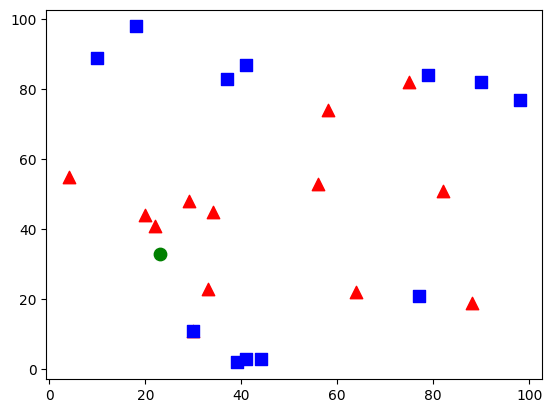How to handle Data, and Images(14) KNN Algorithm
Introduction to KNN Algorithm
Lesson Notes in .ipynb file
How to handle Data, and Images(14) KNN Algorithm
Topics
KNN Algorithm
K-Nearest Neightbor
- KNN is one of the basic example of Supervised Learning as it requires Training Data
- From a lot of different labels, it finds the nearest data and determines its own label
1
2
3
4
5
6
7
8
9
10
11
12
13
14
15
16
17
18
19
20
21
22
23
24
25
26
27
28
29
30
31
32
import cv2
import numpy as np
from matplotlib import pyplot as plt
# we're going to make random 25 datas that consists of either blue square(1) or red triangle(0)
# we're going to make green circle and see what it becomes (either 1 or 0) using KNN
# make a training data with size (25x2) where its x,y coordinates are from 0 to 100
trainData = np.random.randint(0, 100, (25, 2)).astype(np.float32)
# randomly select every data to be either 0 or 1
response = np.random.randint(0, 2, (25, 1)).astype(np.float32)
# make the color of data that is 0 to be red
red = trainData[response.ravel() == 0]
plt.scatter(red[:,0], red[:,1], 80, 'r', marker='^')
# make the color of data that is 1 to be blue
blue = trainData[response.ravel() == 1]
plt.scatter(blue[:,0], blue[:,1], 80, 'b', marker='s')
# make a new data(green circle) and make its x,y coordinate from 0 to 100 randomly
newcomer = np.random.randint(0, 100, (1,2)).astype(np.float32)
plt.scatter(newcomer[:,0], newcomer[:,1], 80, 'g', marker='o')
knn = cv2.ml.KNearest_create()
knn.train(trainData, cv2.ml.ROW_SAMPLE, response)
ret, results, neighbours, dist = knn.findNearest(newcomer, 3)
print("result :", results)
print("neighbours :", neighbours)
print("distance :", dist)
plt.show()
Output:
1
2
3
result : [[0.]]
neighbours : [[0. 0. 0.]]
distance : [[ 65. 130. 200.]]
Summary
From the result above, we can see that the green circle will be labeled as [0] meaning it’ll be red triangle
The neighbours show that all 3 nearest neighbors are [0]
And each of the distance are [65, 130, 200]
This post is licensed under CC BY 4.0 by the author.
